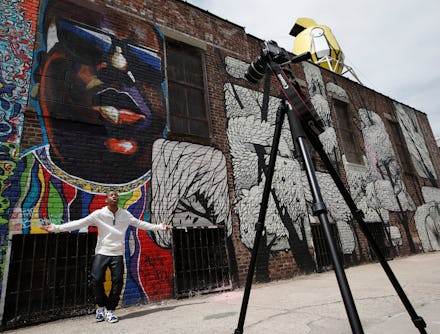4 reasons the Notorious B.I.G.'s death is still one of the biggest unsolved murder mysteries

On March 18, 1997, thousands lined the streets of the Bedford-Stuyvesant neighborhood of Brooklyn, New York, to pay final respects to rapper Biggie Smalls, who was shot and killed on this day 20 years ago in a drive-by shooting in Los Angeles. The funeral procession made its way through the area in which Smalls grew up and had famously rapped about in his music.
In the years since that day, there have been tribute songs, articles, films, murals and acknowledgments of the rapper's death and birthday on social media. But a void is still left in the hearts of fans as the late rap star's murder remains a cold case. Here are four reasons why Smalls' death is still one of the biggest unsolved murder mysteries.
Ties between Biggie and Tupac's death not yet proven
On Sept. 13, 1996, rapper Tupac Shakur was shot and killed in Las Vegas, six months before Smalls' murder. According to a 1997 FBI file released on Smalls' case in 2011, he was killed in retaliation for Shakur's murder, but those claims have yet to lead to arrests in Smalls' case.
In the months leading up to the rappers' deaths, the two emcees were at the center of an East Coast-West Coast rap beef, which started after Shakur was shot in a New York City recording studio in November 1994. Smalls was also at the studio with members of his entourage, leading Shakur to believe Smalls knew about his assailant. In the months after, there were fights between members and associates of Shakur's label Death Row Records and Smalls' label Bad Boy Records at events, according to the FBI documents.
Did Suge Knight and the LAPD cover up Biggie's death?
Russell Poole was the lead detective in Smalls' murder case. During his investigation, he suspected that Death Row label head Suge Knight was behind the killing and enlisted the help of a LAPD officer to arrange it, but no charges were filed against him. It is documented within the FBI files that off-duty LAPD officers worked as security guards at Death Row events. Poole believed Knight's power over the police blocked a deeper investigation from happening. Poole spoke further about his theory in the 2002 documentary Biggie & Tupac.
"Had we been able to aggressively investigate [the B.I.G. shooting] and had the heart to connect the two and do a thorough investigation, I think we probably would have found out more information," Poole said. "I think the fact that law enforcement officers were working for Death Row, and that was a scandal in itself ... Suge Knight, to me, was one of the most powerful gangsters around. He was well-organized, he had a lot of power, and what gave him the powers, he had dozens and dozens of police officers working in his organization."
To add another layer to the case, Poole believed Knight also set up Shakur's killing to avoid paying the rapper millions in profits and royalties, the Rolling Stone reported. Shakur's death also remains unsolved.
Meanwhile, Knight is currently being held on $10 million bail for a murder charge. His trial is expected to begin in early summer.
Lead detective's life and "strange" death
Poole left the LAPD in 1999 but continued working as a private detective; he was later featured in documentaries detailing Smalls' death and a book titled LAbyrinth: A Detective Investigates the Murders of Tupac Shakur and Notorious B.I.G. Smalls' family also filed a wrongful death lawsuit against the city of Los Angeles based on Poole's claims of police involvement in the rapper's killing., though the case was dismissed in 2010.
Poole reportedly had a heart attack in August 2015 while meeting with LAPD investigators about a cold case. He was rushed to the hospital, where he later died, according to the LA Times. Rapper Busta Rhymes dedicated a post to Poole upon hearing the news, calling his passing "strange." With Poole's death, the Smalls case lost one of the most visible investigators and advocates looking to solve it.
Another LAPD detective's explosive claims
In 2011, LAPD investigator Greg Kading came forward with other theories on the deaths of Shakur and Smalls in a book called Murder Rap, which was adapted for a documentary of the same name in 2015. Kading posited that Knight paid Bloods gang member Wardell "Poochie" Fouse $13,000 to kill Biggie. Fouse was killed in July 2003.
Kading also alleged that Sean "Diddy" Comgs had hired a hitman to kill Shakur, according to the Guardian. Diddy called the claims "nonsense" in a 2016 interview with Power 105.1's The Breakfast Club. Kading was part of a task force that began investigating Smalls' death in 2006, the LA Weekly reported, which included the LAPD, the Drug Enforcement Agency and the FBI — though Kading said he was pulled off the force in 2009.
Presently, Biggie's case remains unsolved.
Mic has ongoing Biggie Smalls coverage. Please follow our main Biggie Smalls hub here.